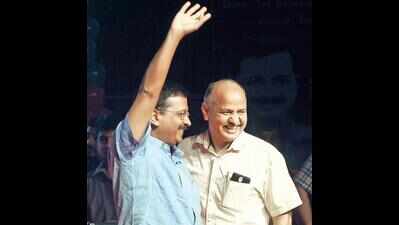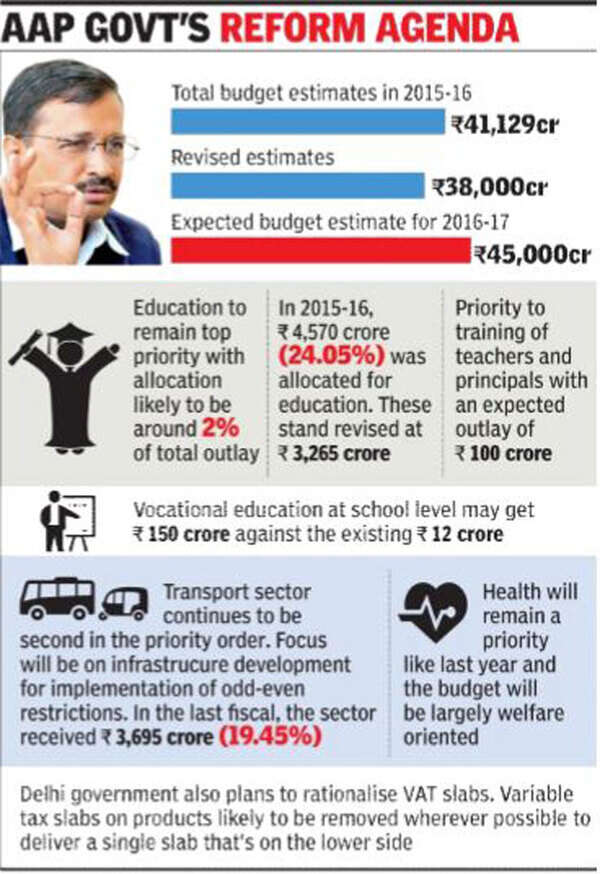- News
- City News
- delhi News
- Delhi Budget 2016: Education may get top billing
Trending
This story is from March 27, 2016
Delhi Budget 2016: Education may get top billing
Chief minister Arvind Kejriwal is likely to make education the focus of the state budget to be presented on Monday. He is expected to allot nearly 25% of the plan expenditure in the budget to education

Delhi CM Arvind Kejriwal with education minister Manish Sisodia.
New Delhi: Chief minister Arvind Kejriwal is likely to make education the focus of the state budget to be presented on Monday. He is expected to allot nearly 25% of the plan expenditure in the budget to education. Last year, the allocation was 24% and the emphasis had been on building model schools, classrooms and better school infrastructure. While these imperatives will remain significant this time too, the Aam Aadmi Party government will add to them the objective of “quality education”, under which funds for the training of teachers and principals can be expected to go up from the current Rs 9 crore to over Rs 100 crore.The Delhi government’s vision of providing vocational education to empower students from Class IX onward will be backed by budgetary support that could rise from the current Rs 12 crore to over Rs 150 crore this year. The scheme will enable students to earn dual certification in academics and a vocational course of their choice at the time they complete Class XII.
Total plan and non-plan allocations this year, according to sources, are likely to go up to more than Rs 45,000 crore from the Rs 41,129 crore provided for in the 2015-16 budget. The revised budget estimates at the end of the year stood at Rs 38,000 crore.
It is reliably learnt that the education sector reforms are being considered in the wake of assessments that teacher training had to be enhanced and both teachers and principals of government schools had to be exposed to the best practices in India and abroad. While Deputy chief minister Manish Sisodia has been talking about raising teaching quality at various platforms, the education department has, for over a year, been deliberating on training modules and short courses in prominent institutions such as the Indian Institutes of Management at home and some universities abroad. The challenge for the government lies in efficiently utilising the funds to develop indigenous training modules for long-term and continuous training of teachers in a fast evolving global education scenario.

The budget that the AAP government proposes to present on Monday is likely to be welfare driven with Kejriwal sticking to his vision that evolves from his focus on his core constituency of the low-income residents of Delhi. With the government proposing to expand the footprint of its participatory framework, the “mohalla sabhas”, to the entire city this year, the party hopes to make good on the promise of reforms in education and health.
A pro-poor budget would also be Kejriwal’s way of keeping his “aam aadmi” image strong and help steer attention away from pressing concerns and areas where his party is yet to be seen as delivering. Bad roads, traffic congestion, pollution, regularisation of unauthorised colonies and housing for poor are some impact areas that have not been addressed adequately by the government.
Total plan and non-plan allocations this year, according to sources, are likely to go up to more than Rs 45,000 crore from the Rs 41,129 crore provided for in the 2015-16 budget. The revised budget estimates at the end of the year stood at Rs 38,000 crore.
It is reliably learnt that the education sector reforms are being considered in the wake of assessments that teacher training had to be enhanced and both teachers and principals of government schools had to be exposed to the best practices in India and abroad. While Deputy chief minister Manish Sisodia has been talking about raising teaching quality at various platforms, the education department has, for over a year, been deliberating on training modules and short courses in prominent institutions such as the Indian Institutes of Management at home and some universities abroad. The challenge for the government lies in efficiently utilising the funds to develop indigenous training modules for long-term and continuous training of teachers in a fast evolving global education scenario.

After education, transport will be the second most important focus area and the sector is set to receive adequately high funding, like the Rs 3,695 (19.5% of plan expenditure) it got last year. The government sees transport as a test case for its commitment to the common man. Having announced already that it will repeat the scheme on restricted road access depending on odd- or even-numbered registration plates in mid-April, Kejriwal's government needs to set aside enough funds for traffic management.
The budget that the AAP government proposes to present on Monday is likely to be welfare driven with Kejriwal sticking to his vision that evolves from his focus on his core constituency of the low-income residents of Delhi. With the government proposing to expand the footprint of its participatory framework, the “mohalla sabhas”, to the entire city this year, the party hopes to make good on the promise of reforms in education and health.
A pro-poor budget would also be Kejriwal’s way of keeping his “aam aadmi” image strong and help steer attention away from pressing concerns and areas where his party is yet to be seen as delivering. Bad roads, traffic congestion, pollution, regularisation of unauthorised colonies and housing for poor are some impact areas that have not been addressed adequately by the government.
End of Article
FOLLOW US ON SOCIAL MEDIA










